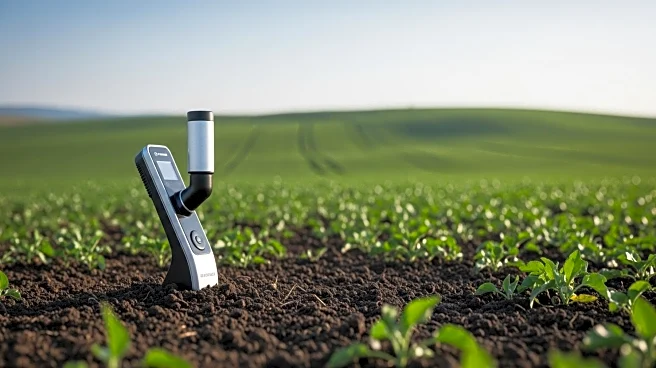What's Happening?
Recent research highlights the risks posed by modern agricultural methods to global soil resilience, which is crucial for food security and environmental stability. The study, published in NPJ Sustainable Agriculture, reveals that intensive practices such as plowing, fertilizer application, and irrigation, while increasing short-term yields, degrade soil quality over time. This degradation reduces the soil's ability to recover from environmental stresses like droughts and floods, leading to issues such as erosion, salinization, and pest infestations. The research emphasizes the importance of balancing productivity with long-term soil resilience to prevent potential tipping points that could disrupt global food and trade networks.
Why It's Important?
The degradation of soil resilience poses significant threats to global food security, biodiversity, and climate stability. As soils support 95% of global food production and store more carbon than forests, their decline could lead to irreversible productivity collapses, affecting food supply chains worldwide. The study calls for a reevaluation of land management practices to prioritize long-term resilience over immediate yield increases. This shift is crucial as the demand for food continues to rise, particularly in regions like sub-Saharan Africa and Southeast Asia, where soil degradation risks are intensifying.
What's Next?
The study suggests adopting alternative agricultural practices such as conservation tillage and integrated pest management to enhance soil resilience. These methods, while requiring trade-offs, could slow or reverse soil damage. The authors warn that ignoring soil resilience could lead to irreversible productivity collapses, urging policymakers and farmers to rethink land management strategies. As global demand for food increases, especially in vulnerable regions, addressing soil degradation becomes imperative to ensure sustainable agricultural practices and food security.
Beyond the Headlines
The findings underscore the ethical and environmental implications of current agricultural practices. The degradation of soil not only threatens food security but also impacts biodiversity and climate stability. The study advocates for a holistic approach to land management that considers long-term ecological health alongside agricultural productivity. This perspective is essential for developing sustainable solutions that balance human needs with environmental preservation.









